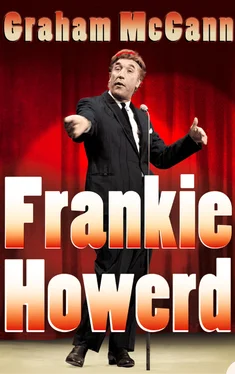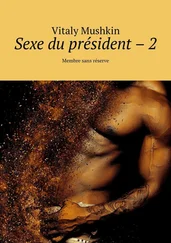1 ...7 8 9 11 12 13 ...25 He also sang the song, in his own inimitable style, for which he would later be infamous â âThree Little Fishesâ:
Down in the meadow in a little bitty pool
Lived three little fishes and their mommy fishy too. âSwim!â said the mommy fishy, âSwim if you can!â So they swam and they swam right over the dam.
Each subsequent verse was disrupted with comic interjections, and each chorus became an excuse for a quite extraordinary array of high-decibel shrieks and yelps:
There was Tom: âBoop-boop-dittem-datten-wattem, choo!â
And there was Dick: âBoop-boop-dittem-datten-wattem, chooo!â And there was Cecil: âBaa-oop-boop-dit-tem-dat-ten-wat-tem, choooo!â (Oh, he was a snob! He was dying to get into an aquarium!) And they swam and they swam right over the dam ⦠12
Snobbish Cecil, needless to say, met with a particularly grisly end.
It was the same routine that he had performed so many times before, but, on this particular occasion, it really seemed to work. There were relatively few noticeable stammers or stumbles, and plenty of well-rehearsed cues for laughs; compared to most of the others taking part, Howard looked as if he knew what he was doing â even when he was pretending not to know what he was supposed to do. His audience, though captive, was genuinely appreciative. He left them calling for more.
More was just what they were going to get. Buoyed by this initial success (âfor me the smell of greasepaint had the same effect as a whiff of cocaine on a junkieâ 13 ), Howard threw himself back into his old routine, and, within a matter of a few short weeks, he had practically taken over the running of these Sunday night productions. He pestered his ostensible superiors until they agreed to let him improve the quality of the programmes; demanded â and received â a bigger say in the title, running order, writing and staging of each production; and he not only bossed about all of the officer-performers during rehearsals but also â much to the amusement of his many new friends among the audience â reduced them to mere stooges during the concerts themselves (âI treated them as bad performers and not as men with pips on their shouldersâ 14 ).
He also worked hard at improving his own act. Always a perceptive student of other performers, he was now able to stand back and think remarkably dispassionately about how best to shape and display his own peculiar talents. His stammer, for example â which had for so long been considered nothing other than a troublesome impediment â was now quite consciously transformed into a positive technique. Instead of struggling vainly against it, as he had done to such distressing effect in front of those grim-faced RADA examiners, he started using it, and sometimes even exaggerating it, along with all of the other obvious aspects of his general nervousness, to help accentuate his originality.
First, he thought of how much more distinctive and real and funny it would sound if, instead of just parroting the polished patter of a well-known professional, he actually appeared to relate the story to his audience as if it had really happened to him. Second, he realised how much easier it would be to fill up his allotted time on stage, and disguise the paucity of his original material, if he mastered the art of, as he put it, âspinning it outâ. 15 Max Miller, for example, would deliver the following joke, word perfect, at his normal rat-a-tat-tat pace:
âEreâs a funny thing happened to me this afternoon. A girl said to me: âHello, Max!â I said: âI donât know you.â She said: âItâs my birthday. Iâm twenty-one today.â She said: âWill you come up to my fiat for coffee and games?â I said: âDonât bother with the coffee â but I will come up.â Well, it was raining outside, and there are only two things to do when itâs raining. And I donât play cards. âEre! 16
Howard, however, would take this basic joke and, through hesitation, deviation and repetition, make it seem entirely his own:
Oh, no, donât, n-n-no, please, donât. No. liss-en! Um. Ah! Youâd have screamed! Oh, you would! Yes. I have to laugh meself when I think about it! Yes. I do. No, er, the thing was, th-th-there was this girl, you see. Yes. This girl. And, oh, she was pretty! What? Pretty? Oh! I should say so! Pret-tee! Yes. This girl. Oh! Ever so pretty. And, er â where was I? 17
On and on he would go, moving forward, pulling back, stepping sideways, moving forward again, drawing his audience deeper and deeper into his distinctive comic world, until, when he sensed that they were ready, he finally hit them with the punchline.
He was no longer trying to hide his own inadequacies. He was no longer trying â and failing â to be like the other stand-up comics. He was now trying â and, increasingly, succeeding â to be more like himself. He started using everything â his arching eyebrows, his skewer-shaped mouth, his swooping vocal inflexions, his risible sartorial awkwardness, his occasional lapses of memory â to make a strength of his imperfection.
Most important of all, he began performing with , rather than to , his audience. They now became âa vital part of the actâ:
I told these stories of misadventure in the form of a cosy âjust between you and meâ gossip, as though leaning over an invisible garden fence or chatting to cronies in the local pub. And just as Mrs Jones can evoke laughter and sympathy by telling her neighbours about her troubles, so I found I could create laughter and sympathy by making the audience share the preposterousness of the improbable (but not impossible) situations in which I put myself as the innocent and misunderstood victim of Them (i.e. authority). 18
It worked. It made âFrankie Howardâ work.
From now on, he would appear irrepressible. The Sunday concert parties grew to seem far more like âThe Frankie Howard Showâ than any orthodox form of ensemble entertainment event. He appeared four or five times during each evening before, inevitably, returning yet again as top of the bill. Not content with his multiple solo spots, he also persuaded his sister, Betty, to take the train from Fenchurch Street to Shoeburyness every Sunday morning in order to join him on stage in an all-singing, dancing, joking double-act (she âcould have been a proâ, he later reflected, âbut her energies were always to be channelled towards furthering my careerâ 19 ). He was everywhere, he was always involved, and it was only a matter of time before he was completely, and officially, in charge.
It was the padre who did it. Howard was still a sincerely religious, churchgoing individual, and, from the moment he arrived at Shoeburyness, he had instinctively gravitated towards, and confided in, the garrisonâs resident chaplain, the Reverend Mackenzie. Mackenzie, in turn, followed Howardâs progress with interest, and, after watching him blossom as an entertainer, helped facilitate a transfer to the Quartermasterâs Office â a move that promised not only a promotion to the rank of Bombardier, but also, more importantly, the prospect of slightly more time for planning performances.
That was by no means the end, however, of the padreâs well-meaning interventions. Keen (for the sake of camp morale in general as well as that of his protégé in particular) to encourage Howardâs countless passionate plans to improve the standard of the garrisonâs in-house entertainment, Mackenzie arranged for him to write a letter to the Commander-in-Chief at Shoeburyness, setting out precisely what was wrong, what needed to be changed, and who should be charged with the power and responsibility to change it. It proved, recalled Howerd, to be âan absolute stinker of a letterâ: 20
Читать дальше












